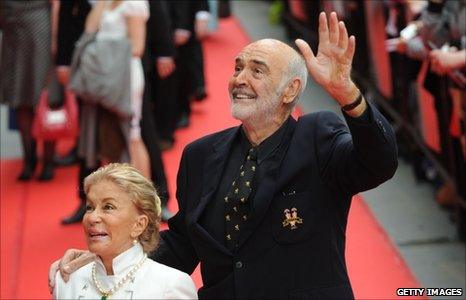Weighing up the cost of culture
- Published

The Edinburgh Film Festival attracts global stars such as Sir Sean Connery
It cost around £3m to create and it has been four years in the making and, in less than two weeks, the new arts funding body Creative Scotland comes into force.
It will have to make some tough decisions about who gets a share of the organisations £60m budget.
With its glitz and glamour and no sign of the austere times, The Illusionist, with its fairytale depiction of Scotland, opened the annual Edinburgh International Film festival.
Its French director, Sylvain Chomet, fell in love with Edinburgh and moved there seven years ago.
"Its left a wonderful impression on me, Scotland, and it's obvious from the film that I really love Scotland," he said.
The film has put Scotland firmly on the animation map, but this tale may not have such a happy ending for Scotland.
The producer of the film, Bob Last, believes opportunities to capitalise on its success are being lost with the merger of Scottish Screen and the Arts Council into a new cultural funding body called Creative Scotland.
"The support of the screen industry in Scotland has been a political football for a long period of time and it's unfortunate that the impact of this film coincides with the demise of Scottish Screen which internationally has been seen as a very forward-looking and innovative intervention," he said.
"I think the key thing that could have been done is to send a clear message to the international community that we were serious about the screen industries and unfortunately that message hasn't gone out."
With the demise of Scottish Screen, film producers and animators will now be competing with artists, orchestras, theatres, the book world, and artists across the field for a share of its £60m budget.
But in an increasingly hybrid world - what do we define as art and who should Creative Scotland be supporting?
Artist Martin Creed's installation lights going on and off is one of the more memorable Turner Prize winners of the past decade.
"Art is things for people to look at and people can look at anything and anything could be described as an art," he said, adding: "I wouldn't argue for giving money to art over and above any other thing."
Creed moves between different art forms - but not all artists have the freedom that financial success brings and many in the creative industries rely on grants to survive.
Ready for launch
Mark Lambert, chief executive of the Scottish Book Trust, said: "The whole question of funding structures, particularly in this new economic malaise, is really a question that needs to be answered.
"Organisations need to know whether they are on a sustainable basis in order to be able to carry out their work."
If the Creative Scotland budget was cut, things could become even more difficult.
Ring-fenced funding of the arts could be a hard sell to the public when their front line services are being cut.
Many in the sector believe the current uncertainty could drive out Scotland's talent.
As the film festival jamboree continues, Scotland's new arts body is almost ready for launch.
It will have to juggle competing interests. It remains to be seen whether its audience will be as receptive as this one.
- Published11 June 2010